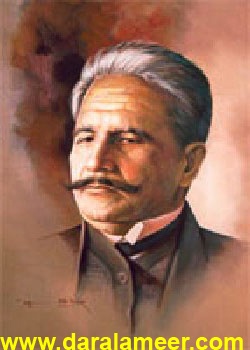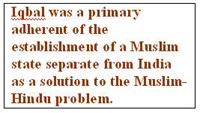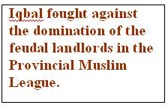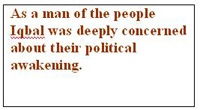Mohammad Iqbal: A Voice of His People*
 As a poet Iqbal represented in perhaps the most sensitive manner the collective consciousness of his people during a certain period of their history. He was able to do so because he maintained a constant and direct contact with his audience at all levels. In the old days the institution of the 'Mushaira' helped the poet to maintain such a contact. But the 'Mushaira' was an exclusive club of the literary and the social elite. By the time Iqbal appeared on the seene poetry was no longer the monopoly of a tiny minority. Iqbal was not a poet of the 'Mushaira'. He was instead a poet of the 'Jalsa'. His participation in the annual general meeting of the Anjuman-i-Himayat-i-Islam – a great forum for all the eminent Muslims of those days – was a regular feature for many years. His audience was not the social elite but the common folks. Unlike the modern Urdu poet who followed him, Iqbal was not writing for a public he did not know, nor was his public listening to a poet it did not understand. There was excellent rapport between Iqbal and his public
As a poet Iqbal represented in perhaps the most sensitive manner the collective consciousness of his people during a certain period of their history. He was able to do so because he maintained a constant and direct contact with his audience at all levels. In the old days the institution of the 'Mushaira' helped the poet to maintain such a contact. But the 'Mushaira' was an exclusive club of the literary and the social elite. By the time Iqbal appeared on the seene poetry was no longer the monopoly of a tiny minority. Iqbal was not a poet of the 'Mushaira'. He was instead a poet of the 'Jalsa'. His participation in the annual general meeting of the Anjuman-i-Himayat-i-Islam – a great forum for all the eminent Muslims of those days – was a regular feature for many years. His audience was not the social elite but the common folks. Unlike the modern Urdu poet who followed him, Iqbal was not writing for a public he did not know, nor was his public listening to a poet it did not understand. There was excellent rapport between Iqbal and his public
New Middle Class
Basically, Iqbal's public was the rising middle class of the Muslim community of the sub-continent, particularly the new intelligentsia-a product of the Aligarh Movement. This new middle class and its intelligentsia was deeply conscious of the separate entity of Muslims as a minority community. The feeling of separate entity had its foundations not only in religion and culture but also in history because Muslims generally identified themselves as inheritors of the traditions of Muslim supremacy for more than 700 years
The Hindus who constituted the majority community organized themselves politically under the banner of the Indian National Congress, and developed the concept of composite nationalism which was supposed to be broadly Indian embracing all religious communities, Muslims, Hindus, Sikhs and the rest, However, Muslim separateness in the cultural sphere was recognized even by the so-called nationalist Muslim who accepted the theory of composite Indian nationalism at the political level. This is apparent from a book of Prof. Mr. M. Mujeeb of the Jamia Millia, Delhi, "The Indian Muslims" written some 20 years after the partition of the sub-continent
This is not the place to go into the history of Hindu-Muslim relations during the 90 year period, 1857-1947. Suffice it to say that the mass of Muslim community did not accept the concept of composite Indian nationalism. Iqbal was perhaps the single major influence in sharpening the feeling of Muslim separateness on the basis of religion, history, tradition and culture. He gave his community a massage of faith hope and struggle. He believed in a dynamic rather than static view of life. Activism, which was the corner stone of Iqbal's philosophical thinking, had a direct relationship with the aspirations of the rising middle class of the Muslim Community
As the years passed by the conflict between the Hindus and Muslims became more and more acute. In fact it became the central problems for the Muslim community. Iqbal's involvement with his community was far too deep for him to ignore this problem. He always had his finger on the pulse of the national sentiment. He, therefore, considered it his bounded duty to give a lead
 Iqbal gave the lead in his presidential address to the annual session of the All-India Muslim League at Allahabad in December 1930. He argued that the principle of European democracy could not be applied to India without recognizing the fact of communal groups. He voiced the demand for a separate Muslim state because "The life of Islam as a cultural force in this country(India) very largely depends on its centralization in a specific territory." He specified the territory by saying: "I would like to see the Punjab, North-West Province, Sind and Baluchistan amalgamated into a single state the formation of a consolidated North-West Indian Muslim State appears to me to be the final destiny of the Muslims, at least of North-West India
Iqbal gave the lead in his presidential address to the annual session of the All-India Muslim League at Allahabad in December 1930. He argued that the principle of European democracy could not be applied to India without recognizing the fact of communal groups. He voiced the demand for a separate Muslim state because "The life of Islam as a cultural force in this country(India) very largely depends on its centralization in a specific territory." He specified the territory by saying: "I would like to see the Punjab, North-West Province, Sind and Baluchistan amalgamated into a single state the formation of a consolidated North-West Indian Muslim State appears to me to be the final destiny of the Muslims, at least of North-West India
Iqbal was at pains to explain that the creation of a separate Muslim state was in the best interests of India and Islam. For India it means security and peace resulting from a balance of power for Islam an opportunity to rid itself of the stamp that Arabian imperialism, was forced to give it, to mobilize its law, its education's its cultural and to bring them into closer contact with its own original spirit and with the spirit of modern times
Twofold Purpose
It is apparent from the above that the purpose for the creation of a separate Muslim state was twofold. It was to end the Hindu-Muslim conflict and also to enable Islam to play its role as a cultural force. Iqbal believed that Islam as a world fact had a commitment to history. In the context of the Indian sub-continent this commitment could only be fulfilled by the creation of a separate Muslim state
It may be of interest to recall that Iqbal was greatly impressed and inspired by Kemal Ataturk's Turkey. In his lecture on "The principle of Movement in the Structure of Islam" which forms a chapter of his book. "The Reconstruction of Religious Thought in Islam", Iqbal paid glowing tributes to modern Turkey and approved its freedom of Ijtihad with a view to rebuilding the law of Shariat in the light of modern thought and experience. He wrote: "The truth is that among the Muslim nations of today Turkey alone has shaken off its dogmatic slumber, and attained self-consciousness. She alone has claimed her right of intellectual freedom: she alone has passed from the ideal to the real
Iqbal thought that most Muslim countries "are mechanically repeating old values, where as the Turk is on the way to creating new values." He than goes on to observe: "If the renaissance of Islam is a fact, and I believe it is a fact, we too one day, like the Turks, will have to re-evaluate our intellectual inheritance
where as the Turk is on the way to creating new values." He than goes on to observe: "If the renaissance of Islam is a fact, and I believe it is a fact, we too one day, like the Turks, will have to re-evaluate our intellectual inheritance
So in Iqbal's view Modern Turkey was the only Muslim country which was trying to fulfill Islam's commitment to history. She could serve as a model for us also. It would be, therefore, quite valid to suggest that the inspiration that Iqbal received from Modern Turkey was perhaps responsible for his demand for a separate Muslim state in North-West India
Fight Against Feudalism
Iqbal was an ailing man when he assumed the leadership of the Punjab Provincial Muslim League in the mid-thirties. He operated from his sick bed. This again is a proof of his intense feeling for his community and his deep involvement in its affairs. The most notable thing about the last two years of Iqbal's life, 1936-1938, as brought our and emphasized by an eminent historian of the period. Dr. Ashiq Hussein Batalvi, is how Iqbal fought against the domination of the feudal landlords in the Provincial Muslim League. He represented the rising middle-class and in fact the mass of the Muslim community. He was acutely conscious of their problems. The Great Depression of the 1930's had its terrible impact on the people of the sub-continent. It, therefore, not surprising to observe that Iqbal was perhaps the first Muslim leader to draw attention to the economic problem of Muslims as a community. In his letter to Jinnah, Iqbal highlighted his concern for the problem on more than one occasion. In his letter of May 28, 1937, he says. "The problem of bread is becoming more and more acute. "The question, therefore, is how is it possible to solve the problem of Muslim poverty? And the whole future of the league depends on the League's ability to solve this question. If the League can give no such promises I am sure the Muslim masses will remain indifferent to it as before
Having posed the question in such candid terms Iqbal goes on to observe: "After a long and careful study of Islamic Law, I have come to the conclusion that if this system of Law is properly understood and applied, at least the right to subsistence is secured to everybody. But the enforcement and development of the Shariat of Islam is impossible in this country without a free Muslim state of states. This has been my honest conviction for many years and I still believe this to be the only way to solve the problem of bread for Muslims as well as secure a peaceful India
 In the same letter Iqbal discusses socialism or social democracy. He use these two terms synonymously. He argues that Jawaharlal. Nehru's socialism could not be accepted by the caste-ridden Hindus society. For Islam the acceptance of social democracy in some suitable form consistent with the legal principles of a revolution but a return to the original purity of Islam, goes on to reassert that in order to make it possible for Muslims in India to solve modern problems, poverty being one of them, "it is necessary to redistribute the country and to provide one or more Muslim state with absolute majorities
In the same letter Iqbal discusses socialism or social democracy. He use these two terms synonymously. He argues that Jawaharlal. Nehru's socialism could not be accepted by the caste-ridden Hindus society. For Islam the acceptance of social democracy in some suitable form consistent with the legal principles of a revolution but a return to the original purity of Islam, goes on to reassert that in order to make it possible for Muslims in India to solve modern problems, poverty being one of them, "it is necessary to redistribute the country and to provide one or more Muslim state with absolute majorities
It may be recalled that Iqbal had originally specified the territory of the proposed Muslim state as consisting of the provinces of the Punjab, Sind North-West Province and Baluchistann. But in the above passage Iqbal also refers to one or more Muslim states with absolute majorities. In his letter of June 21, 1937, Iqbal mentions the other Muslim majority area, Bengal, along with North-West India and raises the Question as to why it should not be considered as a nations "entitled to self-determination just as other nations in India and outside India
Iqbal then goes on to plead for holding the session of the League in Lahore because this would give a fresh political awakening to the Punjab Muslims. He repeated this request in his letter of August 11, 1937, by saying that it would prove to be "a turning-point in the history of the League and an important step toward mass contact
Mass Contact
As a man of the people Iqbal was deeply concerned about the political awakening of the people, hence his emphasis on mass contact
The League session was not held in Lahore but in Lucknow Iqbal did not attend it but in his letter of October 7, 1937 he reverts to the me of mass contact and makes the following suggestion
"The Palestine question is very much agitating the minds of the Muslims. We have a very fine opportunity for mass contact for the purposes of the League. I have no doubt that the league will pass a strong resolution on this question and also by holding a private conference of the leaders decide on some sort of a positive action in which masses may share in large numbers. This will at once popularize the League and may help the Palestine Arabs. Personally I would not mind going to jail on an issue which affects both Islam and India. The formation of a Western base on the very gates of the East is a menace to both
Iqbal's mind was agitated on the Palestine question because the question was agitating the minds of the Muslim people. It is poignant to observe that an ailing Iqbal, barely six months before his death, was prepared to go to jail on an issue which he thought was a menace both to his religion and his country
In summing up one could say that in the Pakistan of Iqbal's concept Islam was to play its role as a cultural force and fulfill its commitment to history. The new country was to solve modern problems by exercising the freedom of Ijtihad and in accordance with the original spirit of Islam and the spirit of modern times. The problem of poverty was to be solved by the acceptance of social democracy in a form consistent with the legal principles of Islam. Finally Iqbal's concern for mass contact underscores his faith in the people's power and in their right to participate and share in the shaping of their destiny. It also implies that power should rest where it belongs
The articles posted on this site represent the opinions of their authors. Dar Al Amir does not necessarily endorse them |



